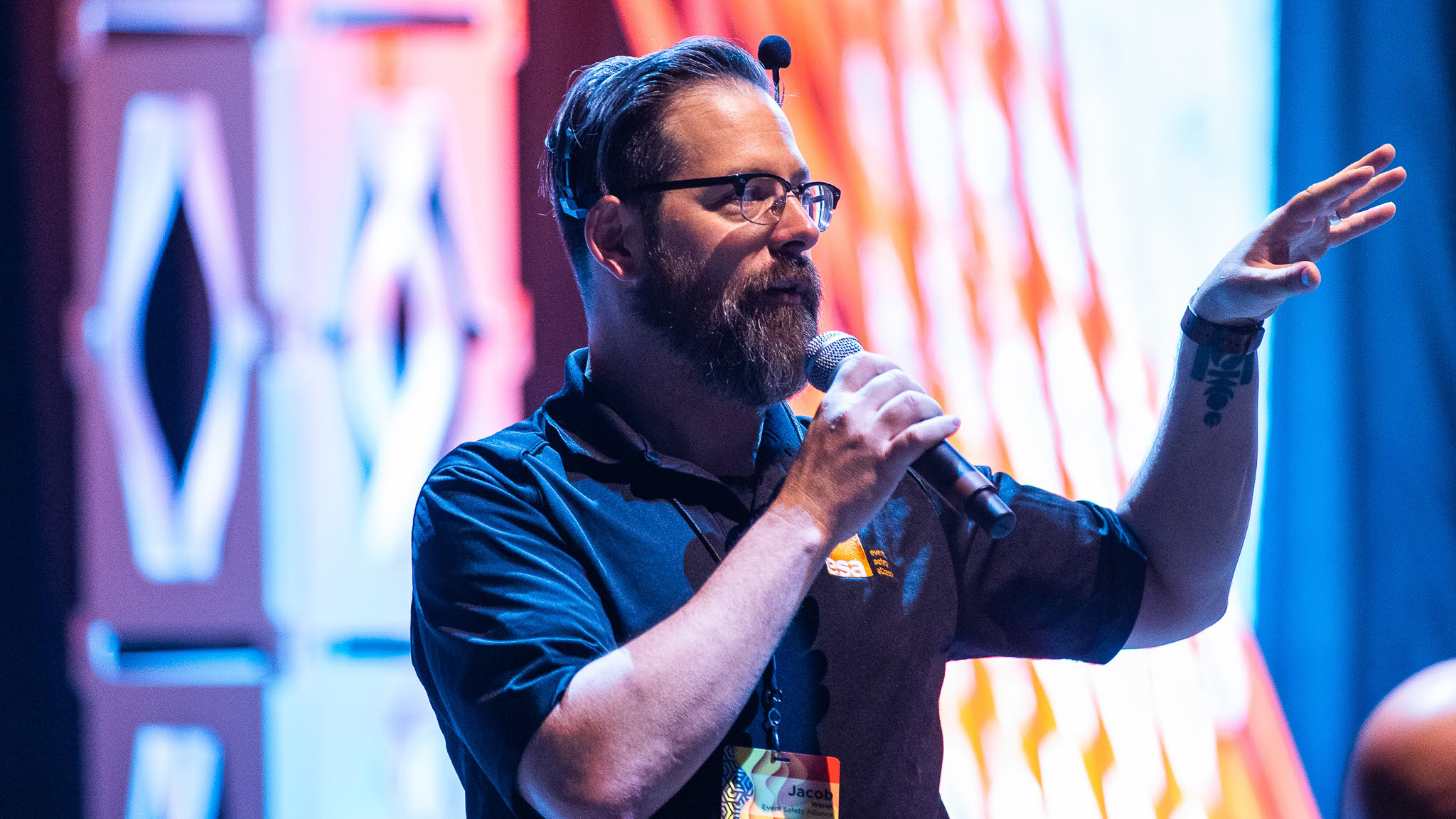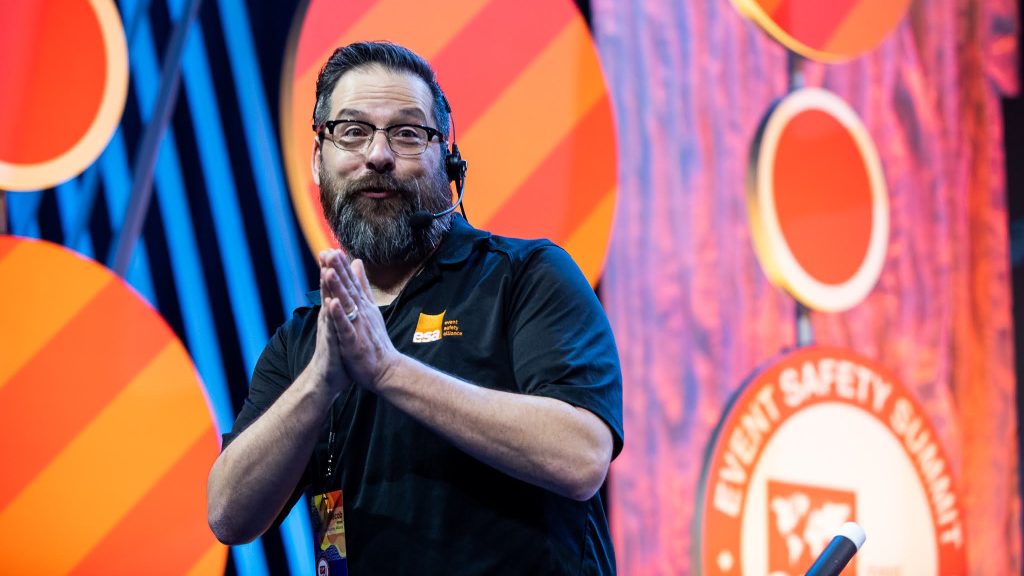

In April 2025 Rhino Staging announced the hiring of longtime live event safety professional Jacob Worek as our new National Director of Safety. In a statement about the hiring, Rhino founder and CEO Jeff Giek said, “We know Jacob well from his years with the Event Safety Alliance, a group Rhino has closely coordinated with since its inception. He is a deeply experienced and knowledgeable safety professional and we can count ourselves fortunate to have him join us.”
What follows here is a wide-ranging, insightful and often humorous conversation with Jacob on where he started, where he’s been and where he’s going.
Getting Started
How did you get into the live event production business and what were you doing prior to that?
Like many in the industry, events were a hobby that became a career. I played in a bunch of bands during high school, and there weren’t many options for underage kids to perform in the area of Michigan where I grew up. We had to create our own scene, and as the kid blessed with an old Peavey P.A. and a car I became the “production company” of choice for nearly every basement show, party, and rave in our small town. I later studied communications in college and spent the bulk of my downtime at the student-run radio station, hosting events and torturing listeners with some truly unlistenable music.
Following graduation I spent time working in radio, indie record labels, A/V companies, venue management…if it involved events I probably tried it for at least a short amount of time.
What was your early experience in live events like and is there anything from that period that remains particularly relevant to you today?
The first “major” event I was involved with was the inaugural Detroit Electronic Music Festival (now Movement Festival) back in 2000. I believe it was the first festival of that scale hosted in Hart Plaza. The vibe was gloriously scrappy and DIY, powered largely by volunteers and the spirit of a scene in town that really needed a win. That first year attracted something like a million people over the course of that weekend. I remember overlooking the crowd on that final night, un-showered and exhausted, and felt a deep sense of satisfaction. Everyone’s individual roles were small, but together we accomplished something great. That’s when everything clicked and the hobby became a career.
Making Safety the Focus
How did safety become your professional focus? Is there something specific, an event or person, that you can point to?
Interestingly enough, my career in event safety stems from my (ill-considered) decision to leave the industry altogether back in 2008. We had just had our first child, and I was struggling with the idea of missing so many of my daughter’s formative moments due to my work schedule. My wife was interested in returning to work, so I took some time away to just be a dad and figure out what I wanted the next phase of my life to look like. My father was in construction management, and having some experience in that industry through a college job, I began exploring a path at getting into construction safety. I took the OSHA 30 to test the waters and found that I genuinely enjoyed it, and immediately started thinking about how to apply what I learned to my freelance gigs. Safety eventually became my primary calling, and the rest is history.
Qualifications Earned
You are a BCSP-certified Safety Management Professional (SMP). What is that exactly and how did you earn it?
The Safety Management Professional certification offered by the Board of Certified Safety Professionals is designed for experienced safety professionals who play a leadership role in managing safety programs, systems, and personnel within their organizations. Like most certifications, you need to meet certain experience and education thresholds, as well as pass a fairly robust examination. It was a lot of work, but well worth the effort. Now that I have it under my belt I’m looking at pursuing the Certified Safety Professional certification, which should keep me occupied for some time.
Do you have other certifications, authorizations, etc. relevant to being a safety professional?
It’s a long list. Aside from the Safety Management Professional (SMP) certification, I’m a certified Safety Trained Supervisor (STS), completed OSHA 30-Hour for both General Industry and Construction, OSHA 10-Hour for General Industry, and a pile of other courses on everything from emergency management to crowd safety. Having completed OSHA 511 last year, I’m halfway through my quest to become an OSHA outreach instructor, with the second required course (OSHA 501) coming up this May.
Professional Endeavors
As a course developer and instructor for the University of California San Diego’s Event Safety certificate program, what courses did you develop and instruct that were most important, interesting, etc. to you and why?
We currently have 9 courses in various stages of development, covering everything from production safety to crowd management. We launched the “Intro to Event Safety” course in November 2024, and delivered “Weather Planning for Events” for the first time this past February. I’m currently deep in the weeds putting together “Event Safety Planning and Design” which is a core course that will walk students through the entire event delivery lifecycle. It’s an incredibly difficult but fulfilling project.
In terms of importance and difficulty, I’d have to say the intro course. It’s incredibly important to get an introductory course right, as it’s often a student’s first exposure to a topic. You have an opportunity to either inspire them or turn them off completely, which is a fun challenge.

You spent 12 years with the Event Safety Alliance. For those who don’t know, what is the ESA and what role does it play in the further development of event safety?
The Event Safety Alliance (ESA) is a 501(c)(6) nonprofit organization dedicated to promoting “Life Safety First” across all phases of live event production and operations. Founded in response to a series of tragic incidents in 2011, ESA’s mission is to empower event professionals and their guests to be safe and aware of risks. It does this through education, standards development, and advocacy. Essentially, ESA tries to keep its finger on the pulse of the industry, identify current and foreseeable safety issues, and develop tools and resources to help professionals protect themselves, their teams, and their events.
Insights
What are the most important developments in the field that you have seen in your years as an event safety professional and/or what similarly important developments are on or just over the horizon?
We’ve seen a monumental shift over the last 10 years about how the industry views safety. Measures that were once seen as burdensome are becoming the norm, and in many cases are being used as market differentiators. We’ve gone from safety being the least “sexy” part of event production to being viewed as the most important one. There’s a long way to go before this becomes universal, but we’ve made meaningful progress which should be celebrated.
Looking ahead, I’m always interested in seeing how new technology impacts safety practice, particularly in terms of AI and its ability to analyze complex datasets with an eye towards trend prediction.
What do you look forward to in your new position with Rhino Staging? What do you feel are the great opportunities and challenges in it?
Safety can be a lonely business sometimes. Too often, you’re seen as the “safety cop”—the person who enforces cumbersome rules and seems to take pleasure in catching others breaking them. Depending on the company, that reputation isn’t entirely undeserved. But Rhino is not one of those places. The safety culture here is unparalleled and genuinely valued by everyone I’ve met. I’m excited to be part of such a thoughtful, supportive team and to help Rhino navigate the challenges of our ever-evolving industry.
Advice to Share
Do you have a piece of advice to share with young people just getting into the live event business and thinking about safety as their focus?
There’s a misconception that safety is all about rules, kit, and compliance. While those are obviously important components, the true roots of safety lie in relationships and care for people. You can know every rule and regulation like the back of your hand, but that means little if you don’t have the trust and buy-in from those most impacted by them. Conversely, if you build trusting and respectful relationships with your peers, your safety programs are more likely to become self-supportive and resilient. Everyone looks out for one another, keeps each other in check, and feels comfortable bringing concerns to the fore.
So my advice for aspiring safety professionals is to nerd out as much as you can, never lose sight of why we do what we do…which is to care for and protect people.
A Final Word
Any particularly great/fun memories from your time in the business that you’d like to share?
I’ll get back to you in a year…the statute of limitations should have run out by then….
Read other of our interviews at the links below.
- Industry Veteran Gary Hinston Joins PPI Advisory Committee
- Carolyn DuRoss Promoted to National Director of Training
- Rhino Florida’s Roman Ivanov Recognized For Outstanding Work At 2024 Miami Grand Prix
- Inside Rhino: Keno Snyder on Fly System Inspection
- Inside Rhino: Lance Cangey, One of Our Top Trainers